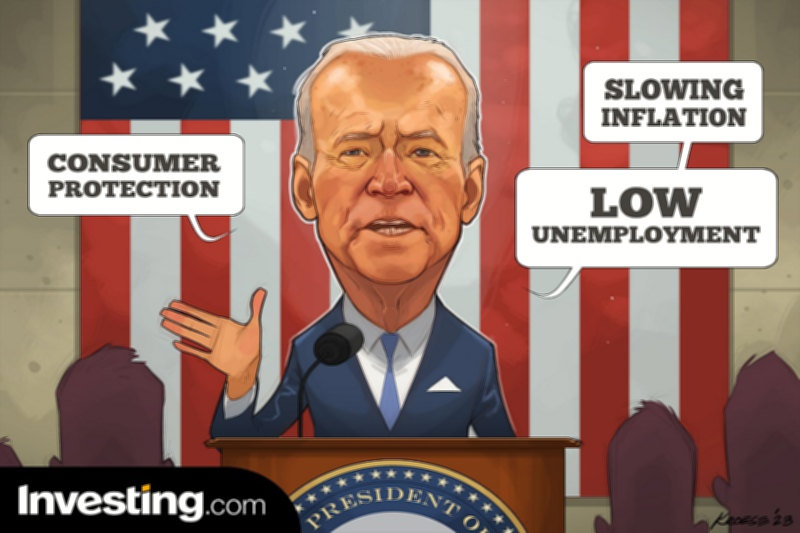Two 59%+ winners, four above 25% in Aug – How this AI model keeps picking winners
By Geoffrey Smith
Investing.com -- U.S. President Joe Biden’s State of the Union speech had some diverting moments of political theater, but his presidency won't depend on scoring points off the likes of Marjorie Taylor Greene and Rick Scott.
Gridlock was what was promised after the Republicans wrested back control of the House of Representatives in November, and gridlock is what we will get.
This may not matter too much to global markets: the direction of the economy was largely set in the first half of Biden’s term as president and would have been unlikely to change much even had the Democrats retained control of the House. The signature economic policy bills of this administration, the Inflation Reduction Act and the CHIPS Act, are already on the statute books - for better or worse - and the next two years are set to be a period of implementation: more green energy and a slow and partial reshoring of manufacturing, notably in the semiconductor sector.
Meanwhile, the Democrats’ control of the Federal Trade Commission and Department of Justice seems likely to keep chipping away at the kind of things that have made the likes of Apple (NASDAQ:AAPL) and Google (NASDAQ:GOOGL) so profitable in recent years, without really denting the investment case for the sector. More far-reaching reform of, say, drug pricing or anything that could radically alter the investment case for pharma or healthcare providers also seems off the table.
It could be worse. Gridlock does at least create a certain predictability, which is a virtue in itself when it comes to policy-making. In any case, the country seems more concerned with finding a way back to a kind of normality after the dizzying upheaval of the pandemic. The last three years have upended the work and consumption patterns of tens of millions and generated an extraordinary level of uncertainty, forcing people to navigate between a stimulus-fueled boom and the slowdown that has followed it.
There is one obvious near-term obstacle on that path back to normality. Thankfully, it's not the tiresome theater around the debt ceiling, where – as always - the awful reality of default will force a resolution before it actually becomes an awful reality.
Rather, the obstacle is inflation, that insidious force that undermines all economic certainty.
Until recently, financial markets had convinced themselves that this battle was won, that inflation’s back was broken, and that the Fed is only not admitting it because it doesn’t want to jinx it. Some more critical voices would rather say that the Fed is having to play at being hawkish today because it has blown its own credibility in letting inflation get out of control in the first place. Only in the last week have expectations for a Fed 'pivot' to rate cuts later this year been dialed back.
Despite the headline CPI falling for six straight months, the view that inflation is finished is almost certainly too optimistic. As we have argued before in this column, the developments of recent years – Europe’s divorce from cheap Russian energy, China’s exhaustion of cheap labor and the U.S.’s refusal to depend on it anymore – are all inherently inflationary. That green energy and those chip plants being planned across the U.S. are all likely to be more expensive, all told, than the energy and the chips they will displace
In the shorter term, China’s economic reopening has put a firm floor under global energy prices, which will limit the disinflationary drag from oil prices this year and continue to drain households’ funds well beyond the date when those pandemic savings have all been spent. Goldman Sachs and JPMorgan both see oil prices back at over $100 a barrel by the end of the year. With the unemployment rate still well below 4% and nearly two vacancies for every unemployed person, workers – emboldened by the current administration – will feel safe enough to push for much higher wages, either through internal negotiations or, as has been the case more recently, by quitting their current jobs.
Other things could also jolt Washington out of its deadlock. A key variable in arguments over government spending must be at what point the administration’s generous military aid packages to Ukraine conflict with the need to observe whatever debt ceiling is in force.
Another variable is the administration’s willingness - or reluctance - to let Chinese relations deteriorate after this week’s drama with the weather/spy balloon and the subsequent reports of new U.S. measures to deny some Chinese technology companies access to dollars.
They are more distant and less calculable threats to markets, however. The rest of Biden’s presidency – and his hopes for re-election – will depend on how inflation behaves between now and November 2024. No election promise of the president's will have any credibility if he allows the wages earned by his core, asset-poor voter base to be debased any further.
